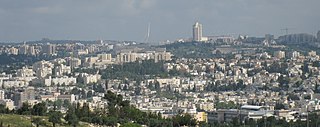
Jerusalem is a city in Western Asia. Situated on a plateau in the Judaean Mountains between the Mediterranean and the Dead Sea, it is one of the oldest cities in the world and is considered to be a holy city for the three major Abrahamic religions: Judaism, Christianity, and Islam. Both Israelis and Palestinians claim Jerusalem as their capital, as Israel maintains its primary governmental institutions there and the State of Palestine ultimately foresees it as its seat of power. Because of this dispute, neither claim is widely recognized internationally.

Palestinians or Palestinian people, also referred to as Palestinian Arabs, are an ethnonational group descending from peoples who have inhabited the region of Palestine over the millennia, and who are today culturally and linguistically Arab.

Zionism is a nationalist movement that espouses the establishment of, and support for a homeland for the Jewish people centered in the area roughly corresponding to what is known in Jewish tradition as the Land of Israel, which corresponds in other terms to the region of Palestine, Canaan, or the Holy Land, on the basis of a long Jewish connection and attachment to that land.

Crime fiction, detective story, murder mystery, mystery novel, and police novel are terms used to describe narratives that centre on criminal acts and especially on the investigation, either by an amateur or a professional detective, of a crime, often a murder. It is usually distinguished from mainstream fiction and other genres such as historical fiction or science fiction, but the boundaries are indistinct. Crime fiction has multiple subgenres, including detective fiction, courtroom drama, hard-boiled fiction, and legal thrillers. Most crime drama focuses on crime investigation and does not feature the courtroom. Suspense and mystery are key elements that are nearly ubiquitous to the genre.
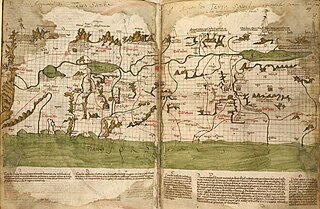
The Holy Land is an area roughly located between the Mediterranean Sea and the Eastern Bank of the Jordan River, traditionally synonymous both with the biblical Land of Israel and with the region of Palestine. The term "Holy Land" usually refers to a territory roughly corresponding to the modern State of Israel and the Palestinian territories. Jews, Christians, and Muslims regard it as holy.

Christian Zionism is a belief among some Christians that the return of the Jews to the Holy Land and the establishment of the state of Israel in 1948 were in accordance with Bible prophecy. The term began to be used in the mid-20th century in place of Christian restorationism.
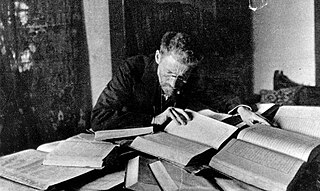
Israeli literature is literature written in the State of Israel by Israelis. Most works classed as Israeli literature are written in the Hebrew language, although some Israeli authors write in Yiddish, English, Arabic and Russian.
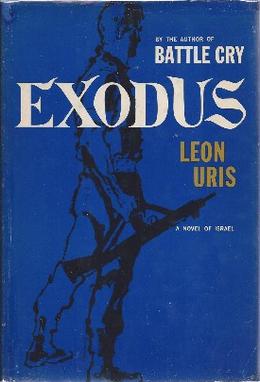
Exodus is a historical novel by American novelist Leon Uris about the founding of the State of Israel beginning with a compressed retelling of the voyages of the 1947 immigration ship Exodus and describing the histories of the various main characters and the ties of their personal lives to the birth of the new Jewish state.
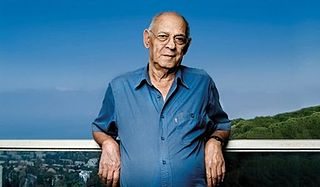
Sami Michael is an Israeli author, having migrated from Iraq to Israel at the age of 23. Since 2001, Michael has been the President of The Association for Civil Rights in Israel (ACRI).

Avner Falk is an Israeli clinical psychologist and author. Falk has written psychoanalytic studies of Jewish and Israeli leaders, Jewish history, the Arab–Israeli conflict, antisemitism and Islamic terrorism.

Gilbert Achcar is a Lebanese socialist academic and writer. He is a Professor of Development Studies and International Relations at the School of Oriental and African Studies of the University of London.
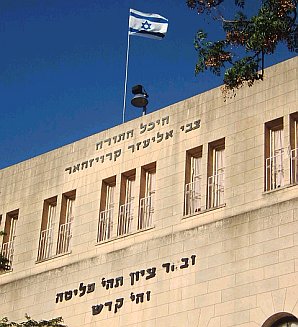
From the founding of political Zionism in the 1890s, Haredi Jewish leaders voiced objections to its secular orientation, and before the establishment of the State of Israel, the vast majority of Haredi Jews were opposed to Zionism. This was chiefly due to the concern that secular nationalism would redefine the Jewish nation from a religious community based in their alliance to God for whom adherence to religious laws were “the essence of the nation’s task, purpose, and right to exists,” to an ethnic group like any other as well as the view that it was forbidden for the Jews to re-constitute Jewish rule in the Land of Israel before the arrival of the Messiah. Those rabbis who did support Jewish resettlement in Palestine in the late 19th century had no intention to conquer Palestine and declare its independence from the rule of the Ottoman Turks, and some preferred that only observant Jews be allowed to settle there.
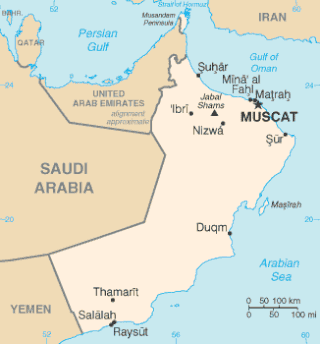
There was a Jewish presence in Oman for many centuries, however, the Jewish community of the country is no longer in existence.

Musta'arabi Jews were the Arabic-speaking Jews, largely Mizrahi Jews and Maghrebi Jews, who lived in the Middle East and North Africa prior to the arrival and integration of Ladino-speaking Sephardi Jews of the Iberian Peninsula, following their expulsion from Spain in 1492. Following their expulsion, Sephardi Jewish exiles moved into the Middle East and North Africa, and settled among the Musta'arabi.

"A land without a people for a people without a land" is a widely cited phrase associated with the movement to establish a Jewish homeland in Palestine during the 19th and 20th centuries. Its historicity and significance are a matter of contention.
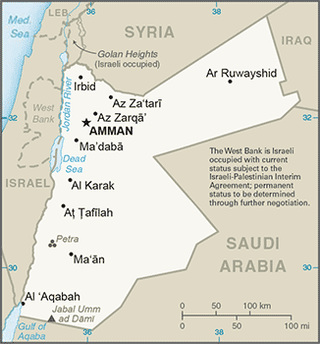
The history of Jews in Jordan can be traced back to Biblical times. Presently, there are no legal restrictions on Jews in Jordan, and they are permitted to own property and conduct business in the country, but in 2006 there were reported to be no Jewish citizens of Jordan, nor any synagogues or other Jewish institutions.
Muslim supporters of Israel refers to both Muslims and cultural Muslims who support the right to self-determination of the Jewish people and the likewise existence of a Jewish homeland in the Southern Levant, traditionally known as the Land of Israel and corresponding to the modern polity known as the State of Israel. Muslim supporters of the Israeli state are widely considered to be a rare phenomenon in light of the ongoing Israeli–Palestinian conflict and the larger Arab–Israeli conflict. Within the Muslim world, the legitimacy of the State of Israel has been challenged since its inception, and support for Israel's right to exist is a minority orientation. Pro-Israel Muslims have faced opposition from both moderate Muslims and Islamists, with many being subjected to harassment, threats and violence.
Sami Hadawi was a Palestinian scholar and author. He is known for documenting the effects of the 1948 Arab–Israeli War on the Arab population in Palestine and publishing statistics for individual villages prior to Israel's establishment. Hadawi worked as a land specialist until he was exiled from Jerusalem after a fierce battle in his neighborhood between Israeli and Jordanian forces. He continued to specialize in documenting Palestine's lands and published several books about the 1948 Palestine war and the Palestinian refugees.

Temple denial is a claim advanced by Palestinian political leaders, religious figures, intellectuals, and authors that the successive Temples in Jerusalem did not exist or were placed other than on the Temple Mount.

Thriller film, also known as suspense film or suspense thriller, is a broad film genre that evokes excitement and suspense in the audience. The suspense element found in most films' plots is particularly exploited by the filmmaker in this genre. Tension is created by delaying what the audience sees as inevitable, and is built through situations that are menacing or where escape seems impossible.


















